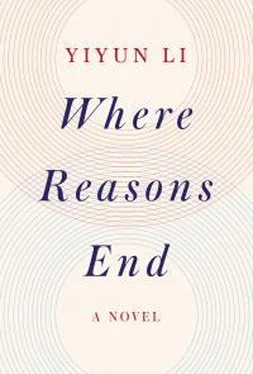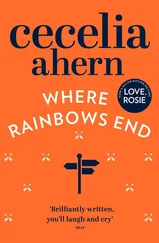Okay, I said. You won. I don’t understand it, and I don’t believe it, either.
Are all parents expert equivocators?
I suppose the best among them are, I said. I’m not.
Why not? You’re a good mother.
Not good enough to make you stay, I thought.
Well, I live in the moment now, he said.
In the moment: a life made of today and today and today and today. If that’s all he has now, is it all I have, too?
If you don’t mind my saying, what I have has nothing to do with what you have. Why put a bet on a nobody? You should make up your mind about what you want.
My mind is made up, I thought. It has always been. I want yesterday and today and tomorrow, all with Nikolai in it.
You often complain I want too much, he said.
Any parent would want what I want, I said.
Not necessarily.
Any reasonable parent.
Your argument doesn’t stand, he said. A reasonable person can still want too much.
But a little more time, how can that be called too much? I said, though I knew I risked losing the argument. Are five years considered a little more in a lifetime? Ten?
Time is like money. Don’t get into debt by spending what you don’t have, he said.
I thought about the class he was to take in the spring, personal finance, which he had been looking forward to. What circumstance permits one to ask for tomorrow on trust?
None, he said. Time is a difficult debt to pay off. Impossible.
How do you know?
Because I’ve done that.
Did he mean that he had overdrafted his tomorrows? I remembered, when he was little, I had flinched whenever people called him precocious.
You kept saying, Be patient, he said. Many times I thought, Okay, let me believe you this once and wait, and things may change, and I may feel differently.
Most people do that, I said.
I suppose most people don’t want to admit failure so they keep taking more credits from more tomorrows and get into deeper debt.
What if that is what people call patience? I said.
I wasn’t a patient person. Neither was Nikolai. The root of patience comes from Latin, to suffer or suffering. What are other words that link pain to time, time to pain?
Nostalgia? Nikolai asked.
Nostalgia: home plus pain. Does he ever feel nostalgic, I thought.
I didn’t leave home, Mommy, he said.
Still, I wish I had taught you how to postpone suffering.
If you haven’t learned it yourself you can’t teach me, he said.
A parent’s folly, I thought, is to want to give a child what she does not have. A parent has to be quixotic. The word reminded me what I had forgotten all these weeks, that on the day Nikolai had died, when I had not known it would happen, I had been listening to Don Quixote on a long drive. I had been laughing to myself in the car. I had laughed at times since then, but that laughter in the car—quixotic—would never be mine again.
Are you not speaking because you’ve lost another argument? Nikolai asked. It was an odd relief that he would not see my tears. He had seen me cry only three times in his life.
No, just feeling sad, I said.
Still?
Still? I said. Sometimes I’m so sad I feel like a freak.
That sounds like self-pity unrestrained, he said.
I thought about my language. Indeed he was right. Not only was it immoderate but it was imprecise. How do you compare sadness that takes over like an erupted volcano to sadness that stays inside one, still as a stillborn baby? People talk about grief coming and going like waves, but I am not a breakwater, I am not a boat, I am not a statue left on a rocky shore, tested for its endurance.
Let me revise, I said. Sometimes sadness makes me unable to write.
Why write, he said, if you can feel?
What do you mean?
I always imagine writing is for people who don’t want to feel or don’t know how to.
And reading? I asked. Nikolai was a good reader.
For those who do.
For weeks I had not read well. I picked up books and put them down after a page or two, finding little to sustain me. I was writing, though, making up stories to talk with Nikolai. (Where else can we meet but in stories now?)
See my point? he said. You cannot not write. You don’t even mind writing badly.
Because I don’t want to feel sad or I don’t know how to feel sad?
What’s the difference? he said. Does a person commit suicide because he doesn’t want to live, or doesn’t know how to live?
I could say nothing.
I can always win an argument against you—do you notice that? he said.
Had I argued better, would he have stayed longer in this world? I didn’t ask him the question. Like sadness, it was there all the time.
Instead I read him a poem I had translated from Chinese, one I had memorized when I turned twelve but only began to understand now.
When young, I knew not the taste of sorrow
But loved to climb the storied towers
I loved to climb the storied towers
To compose a new poem, faking sorrow
Now I have known the taste of sorrow
and want to talk about it, but I refrain
I want to talk about it, but refrain
And say merely: a chilly day, what a fine autumn
Is it a fine autumn? he asked.
Yes, I said. And a chilly day.
7
So Many Windows, So Many Flowers
I wonder if I should start keeping a dream diary, I said.
The night before I had not slept well. When I woke up in the morning I knew Nikolai had been in my dream, but other than a mood, not a glimpse of time or place or his face remained.
If you want to, he said.
Did you like doing that? I asked. Nikolai had experimented with keeping a dream diary for a while. In a computer file, among many files that we had decided not to retrieve.
Marginally, he said. Why do you want to do it?
Why, I thought, isn’t it obvious?
Not so to me, he said.
I told him that I wanted to remember the dreams in which he appeared.
Why do you want to remember them when you can talk with me? he said. Anyway your dreams are wishy-washy.
I had no doubt that what we had was realer than dreams. Still, it was only words we shared. We could not see each other. If a dream was kind it would grant what one wanted to see.
Dream on, he said.
In the past weeks I had seen him clearly only once—the other dreams, all like last night’s, had fallen into the caprice of the human brain. A few days after he had died, in my dream we went to a hospital to pick him up. We waited where there was a compass on the floor, pointing to all four branches of the building, and we were there for a long time before we spotted him among people, many pushed around in wheelchairs. He was walking toward us, with an unhurried elegance that I often associated with a gray heron. But before he reached us I blinked and he vanished.
Oh gosh, Nikolai said.
What?
It’s too neat, he said. A neat dream is all about self-indulgence.
Nikolai had been an early riser like me. Come here, Mommy, he used to call when he heard me up, in the same tone that had not changed between ages three and sixteen. I need my coffee, I often said, and I need my morning reading before I can talk. But he would insist, Come here, so I would sit on his bed, and he would wrap his comforter around, making himself into an eggroll. I had a dream last night, he would start. His dreams were about running, flying, teleporting, metamorphosing, but a few dreams had delighted or saddened me so much that I had recorded our conversations verbatim.
Here’s one, from middle school:
I had an exhausting dream, he said the moment I sat down by him one morning. I dreamed that I was a negative number, and I couldn’t figure out my square root.
Читать дальше












